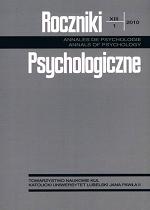Somnambulizm. Obraz kliniczny i terapia
Somnambulism. Clinical manifestations and therapy
Author(s): Aleksander Waś, Konrad Janowski, Agnieszka JelińskaSubject(s): Psychology
Published by: Towarzystwo Naukowe KUL & Katolicki Uniwersytet Lubelski Jana Pawła II
Keywords: somnambulism; sleepwalking; parasomias; sleep disorders
Summary/Abstract: Somnambulism (sleepwalking) is a non-organic sleep disorder of the parasomnia type with estimated prevalence of 15% in children and 3% in adults. Its clinical symptoms include performing complex motor activities (e.g. walking, eating) during the non-REM sleep stage, without full awakening and with amnesia of the event on the following morning. The knowledge about somnambulism is usually fragmentary both among psychologists and physicians, and the significance of this disorder tends to be neglected in clinical practice. The objective of this paper is, therefore, to provide psychologists and other professionals with an update on recent developments in the knowledge of somnambulism. The paper addresses the issues of prevalence of sleepwalking, its clinical manifestations, pathophysiology, diagnostic criteria, comorbidity, etiology, pathomechanisms, diagnostic methods and attempts of treatment. Finally, based on the presented review, clinical and research implications for psychologists are outlined.
Journal: Roczniki Psychologiczne
- Issue Year: 13/2010
- Issue No: 1
- Page Range: 155-175
- Page Count: 21
- Language: Polish

